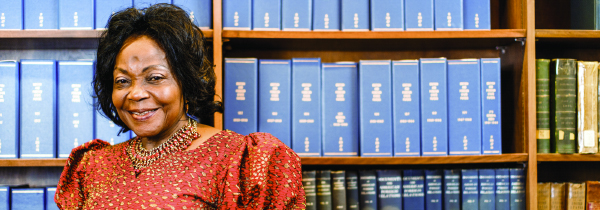 |
 |
||||||||||||||

Justice to the World
Joyce Aluoch helps decide the planetís thorniest human rights casesAs a girl in Kenya, Joyce Aluoch, F08, wasn’t allowed to choose her own professional path—her father chose for her. “I had just completed high school and wanted to enjoy myself,” she said in a recent conversation at Tufts, where she was about to receive a distinguished achievement alumni award. Her father asked her one morning to accompany him on a mysterious errand in Nairobi. She had no idea where they were headed until they arrived—with no appointment—at the Kenya School of Law. “My father was a tall, towering man, and he went straight to the door of the principal’s office, with me trotting behind him,” Aluoch recounted.
Now that she is Her Excellency Judge Joyce Aluoch, first vice president of the International Criminal Court, in The Hague, it appears her father knew what he was doing. Aluoch earned a diploma from the Kenya School of Law and a law degree from the University of Nairobi. She worked her way up in the profession, serving as a judge in the High Court of Kenya for more than twenty years before earning a seat on the Court of Appeal.
It was momentous work, to be sure. She trained judges, magistrates, and paralegals in international human rights. She served as vice chair of the United Nations Committee on the Rights and Welfare of the Child. She also chaired a similar committee in the African Union, in which capacity she negotiated with the Sudanese government to secure children’s rights and went on a fact-finding mission to northern Uganda to study the effects of twenty years of war on children. But Aluoch was not satisfied. She felt she could accomplish more if she broadened her training beyond law.
What drew her to Tufts was a chance encounter with a Kenyan woman who had completed the Fletcher School’s Global Master of Arts Program. The alumna told her all about GMAP—how it enables professionals around the world to earn a master’s degree with minimal disruption to their careers (requiring only three two-week sessions in residence). Aluoch decided to enroll, focusing on international relations.
As she was finishing her studies in 2008, she learned that the International Criminal Court (ICC) was accepting applications. The timing was bad—she was preparing for her exams and thesis defense. “When you are finished with the GMAP, you cannot even see, as your eyes are heavy from too much reading,” she said. “I went to New York for four days just to recover.” By the time she returned, the application period had closed.
But another opportunity arose a few months later, and Aluoch jumped on it. Her long experience as a judge and her newly minted master’s degree helped move her to the top of the list. She was nominated for the position on the bench by the Kenyan government, and elected by the ICC’s governing body.
Aluoch’s tenure at the ICC has thrust her into the midst of the world’s highest-profile human rights cases. Since its founding by international treaty in 2002, the ICC has prosecuted twenty-two cases, including ones against leaders of the violent Ugandan militia group known as the Lord’s Resistance Army and against Libya’s Muammar Gaddafi before his death in 2011.
The court relies on member states for cooperation in arrests, investigations, and witness protection. “The ICC has no police force,” Aluoch said. And as a rule, it has jurisdiction only over crimes committed in the territory of its member states or by a national of such a country. This means that ISIS atrocities carried out in Syria and Iraq, which are not member states, fall outside the ICC’s purview (unless referred to the court by the UN Security Council).
Aluoch hopes to see as many countries as possible join the ICC. Elected first vice president of the court in March 2015, she joined Silvia Fernández de Gurmendi of Argentina, president, and Kuniko Ozaki of Japan, second vice president. “The presidency is the face of the court, and an all-female presidency is unprecedented,” Aluoch said.
She’s also a mother and a grandmother. Aluoch and her husband, Joseph (to whom she has been married since law school), have raised three daughters. “Being married and having children should never stop any woman from pursuing whatever she wants to pursue in her life,” she said. Unlike their mother, the daughters—Brenda, a lawyer and banker; Sandra, an IT specialist; and Constance, a fashion stylist—all had the opportunity to choose their own careers.
STEPHANIE THURROTT, a Boston-area writer and editor, has written for Boston Home and Garden, New England Travel and Life, and Creative Living.